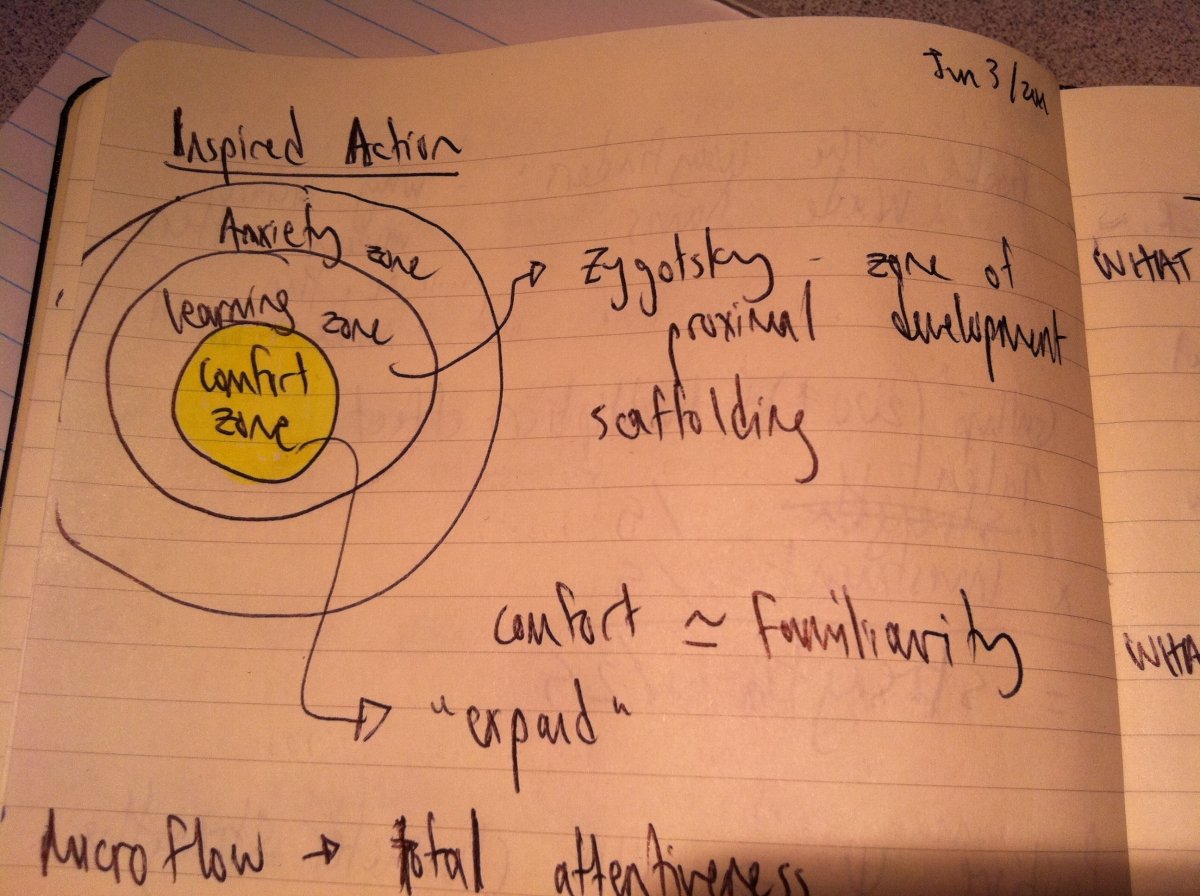
We’ve all heard the phrase “comfort zone.” We’ve probably all been told at one point or another to get outside of it, too.
But what exactly does that mean? We can make all sorts of fancy diagrams and models to illustrate the concept, but does that really do justice to lived experience?

This diagram appears to make sense, despite my mangled writing. It suggests that there’s an optimal “learning zone” that comes somewhere between comfort and anxiety. It also evokes thoughts of something called the Yerkes-Dodson Law, which states that performance is generally optimized under conditions with a moderate amount of stress – too little and you’re not motivated, too much and you’re overwhelmed.
One might also begin to think about Zygotsky’s theories of developmental psychology, in which he espouses the “zone of proximal development,” or the conditions in which the boundaries of your comfort/skill exist, and someone with more expertise in that area can effectively guide, or “scaffold” you into getting better.
So, under this kind of thinking, your comfort zone isn’t really a good thing. It keeps you from learning, from growing. It’s where you hang out on your day off and, gloriously, accomplish absolutely nothing all day.
Well, I don’t know about you, I’ve about had it with all these people telling me to get out of my comfort zone. I don’t really think it’s a bad thing to be in your comfort zone, and I’ll tell you why.
Your comfort zone is where your strengths are. When you’re constantly focusing on putting yourself in challenging situations, you’re not making use of your strengths very wisely. You might say to yourself, “but I need to get better at public speaking! I should spend more time outside my comfort zone speaking in public.”
Okay, so you’re not great at public speaking. So, what’s something that you are great at? Why not spend your valuable time and energy in that area, where you’re more likely not only to be comfortable, but also happy, productive, and successful? Maybe that something is presentation design, event planning, or something like that. Contrary to popular belief, not everyone has to be great public speaking. And while you’re investing a ton of hard work into improving in this small area, your strengths are going unused.
“But wait! How am I supposed to learn anything new?” you might say.
Well, the above model would suggest that you take small steps outside of your comfort zone until you’re comfortable with those new steps, having effectively expanded your comfort zone.
I think this reinforces my point. The comfort zone is where we want to be – the whole point of getting outside of it is to make it bigger, right? That seems kind of tedious. Why do we have to go outside at all? Isn’t it feasible to suggest that you can make your comfort zone bigger while staying inside it?
Take the things you’re good at and apply them in new situations. Look at the fundamental skills that are required to perform a task that seems daunting, and relate them back to skills that you already have. Everything can be boiled down to fundamental skills – if you have those, you can apply them in all sorts of new situations. Some people are great organizers. Others are adept at thinking on their feet. Maybe it’s analytic abilities for others. And the list goes on…
The problem is that most people aren’t fully aware of their strengths. In fact, people will often only realize they’re good at something after they’ve already done it, thinking the whole time that it would have been really challenging. So, your comfort zone is actually much bigger than you think it is, because you have a whole bunch of strengths that you just don’t know about yet.
The trick here is self-awareness. Wouldn’t you like to know about all those things you’re great at?
You’d never have to leave your comfort zone again…
But self-awareness can be tricky. So tricky, in fact, that I devoted a whole post to the topic















